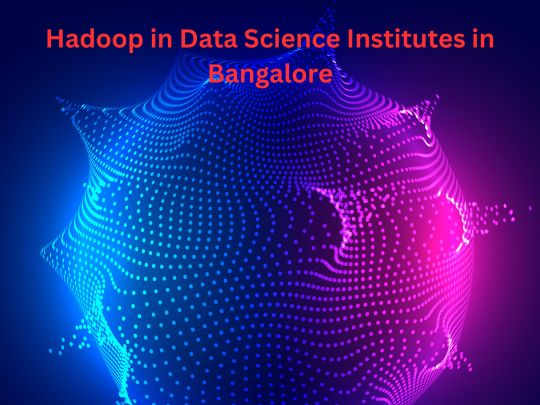If you are into the world of data science, chances are that you are familiar with Hadoop. For those who don’t know, Hadoop is one of the most powerful open-source software framework, which is the best choice to store and process large-scale data without compromising efficiency. In fact, Hadoop is popular among big data analytics, the process used to get a deeper insight into large-sale data. The beauty of Hadoop is that it allows you to process structured and unstructured data like sensor data, social media posts, videos, images and text, to name a few. In this article, we will talk about Hadoop in data science institutes in Bangalore. Read on to find out more.
Advantages of Hadoop
Data science is the field of study that involves using scientific methods, algorithms, and systems to extract knowledge and insights from data. Data science can help organizations make better decisions, improve products and services, and discover new opportunities.
Being a Data Scientist is just a step away. Check out best data science course with placement in Pune at 360DigiTMG and get certified today.
However, data science have a lot of challenges to face, such as dealing with large and complex data sets, ensuring data quality and security, and finding the right tools and techniques for analysis.
Hadoop is one of the tools that can help data scientists overcome these challenges. Hadoop is an open-source software framework that allows you to store and process huge amounts of any kind of data, quickly and efficiently. Now , let’s discuss some of the advantages of using Hadoop for data science.
Computing power
First of all, Hadoop can distribute data and calculations across multiple nodes (computers) in a cluster, which increases the processing speed and performance. The more nodes you have, the more power you have. In other words, you can increase the number of computers to add to the computing power that you may already have. This is one of the greatest advantages of Hadoop.
Fault tolerance
Hadoop can protect your data and applications from hardware failure by automatically storing multiple copies of data on different nodes. If one node is down, Hadoop can redirect the tasks to other nodes without losing any data or functionality. Therefore, Hadoop is your best bet if you are after high fault tolerance.
Looking forward to becoming a Data Scientist? Check out the Data Science Course with Placement and get certified today.
Flexibility
The good thing about Hadoop is that it does not require you to preprocess or format your data before storing it. Instead, you can store as much data as you want and decide how to use it later. Apart from this, you can use different tools and languages to analyze your data, such as MapReduce, Hive, Pig, and Spark, to name a few.
Low cost
Hadoop is free and open-source, which means you don’t have to pay any license fees or royalties. You can also use commodity hardware (easily available) to store and process your data, which reduces the operational costs.
Scalability
Hadoop can easily scale up or down based on your needs for data. You can add or remove nodes from your cluster without any disruption or downtime. Hadoop can handle petabytes of data or more without any problem.
Hadoop is not only a technology but also an ecosystem of related components and projects that enhance its functionality and usability.
Ecosystem and related components of Hadoop
360DigiTMG offers the best data science course with placement in Chennai to start a career in Data Science. Enroll now!
HDFS:
HDFS is short for Hadoop Distributed File System, which is the storage layer of Hadoop that stores data across multiple nodes in a cluster. It provides high availability, reliability, and scalability for your data.
MapReduce
The programming model of Hadoop that allows you to write applications that can process large amounts of data in parallel on a cluster. It consists of two phases: map and reduce.
The map phase applies a function to each input record and generates intermediate key-value pairs. The reduce phase aggregates the intermediate values associated with the same key and produces the final output.
Become a Data Scientist with 360DigiTMG data science training institute in Hyderabad. Get trained by the alumni from IIT, IIM, and ISB.
YARN
The resource management layer of Hadoop that allocates and manages resources (CPU, memory, disk, network) for applications running on a cluster. Apart from this, it schedules and monitors the execution of tasks on different nodes. YARN enables Hadoop to support multiple types of applications besides MapReduce, such as Spark, Hive, Pig, and so on.
Hive
A data warehouse system for Hadoop that allows you to query and analyze structured or semi-structured data using a SQL-like language called HiveQL. It converts your queries into MapReduce jobs and runs them on a cluster. Besides, Hive provides a metadata layer that describes the schema and properties of your data.
Pig
A scripting language for Hadoop that allows you to perform complex data transformations and analysis using a high-level syntax called Pig Latin. It also converts your scripts into MapReduce jobs and runs them on a cluster. Pig is useful for exploring and prototyping your data pipelines before implementing them in MapReduce or other languages.
Looking forward to becoming a Data Scientist? Check out the best data science training institutes in Bangalore and get certified today.
HBase
A distributed database system for Hadoop that provides random access and real-time read/write operations on large-scale structured or semi-structured data. It is based on the Google Bigtable model and stores data in tables consisting of rows and columns. HBase is suitable for applications that require low-latency and high-throughput access to your data, such as web analytics, online gaming, etc.
Long story short, Hadoop is a powerful and versatile framework for data science that can handle any kind of data, provide massive storage and processing capabilities, and offer a range of tools and components to suit different needs and preferences. Learning Hadoop can open up many career opportunities and prospects for data science professionals, as the demand for big data analytics is growing rapidly in various domains and industries. So, if you want to opt for the best institute in Bangalore, we suggest that you consider some essential factors like curriculum quality, faculty experience, reputation, fees and the placement records, just to name a few. Therefore, you may want to take your time when choosing the best institute.
Data Science Training Institutes in Other Locations
Tirunelveli, Kothrud, Ahmedabad, Hebbal, Chengalpattu, Borivali, Udaipur, Trichur, Tiruchchirappalli, Srinagar, Ludhiana, Shimoga, Shimla, Siliguri, Rourkela, Roorkee, Pondicherry, Rajkot, Ranchi, Rohtak, Pimpri, Moradabad, Mohali, Meerut, Madurai, Kolhapur, Khammam, Jodhpur, Jamshedpur, Jammu, Jalandhar, Jabalpur, Gandhinagar, Ghaziabad, Gorakhpur, Gwalior, Ernakulam, Erode, Durgapur, Dombivli, Dehradun, Cochin, Bhubaneswar, Bhopal, Anantapur, Anand, Amritsar, Agra , Kharadi, Calicut, Yelahanka, Salem, Thane, Andhra Pradesh, Greater Warangal, Kompally, Mumbai, Anna Nagar, ECIL, Guduvanchery, Kalaburagi, Porur, Chromepet, Kochi, Kolkata, Indore, Navi Mumbai, Raipur, Coimbatore, Bhilai, Dilsukhnagar, Thoraipakkam, Uppal, Vijayawada, Vizag, Gurgaon, Bangalore, Surat, Kanpur, Chennai, Aurangabad, Hoodi,Noida, Trichy, Mangalore, Mysore, Delhi NCR, Chandigarh, Guwahati, Guntur, Varanasi, Faridabad, Thiruvananthapuram, Nashik, Patna, Lucknow, Nagpur, Vadodara, Jaipur, Hyderabad, Pune, Kalyan.
Data Analyst Courses In Other Locations
Tirunelveli, Kothrud, Ahmedabad, Chengalpattu, Borivali, Udaipur, Trichur, Tiruchchirappalli, Srinagar, Ludhiana, Shimoga, Shimla, Siliguri, Rourkela, Roorkee, Pondicherry, Rohtak, Ranchi, Rajkot, Pimpri, Moradabad, Mohali, Meerut, Madurai, Kolhapur, Khammam, Jodhpur, Jamshedpur, Jammu, Jalandhar, Jabalpur, Gwalior, Gorakhpur, Ghaziabad, Gandhinagar, Erode, Ernakulam, Durgapur, Dombivli, Dehradun, Bhubaneswar, Cochin, Bhopal, Anantapur, Anand, Amritsar, Agra, Kharadi, Calicut, Yelahanka, Salem, Thane, Andhra Pradesh, Warangal, Kompally, Mumbai, Anna Nagar, Dilsukhnagar, ECIL, Chromepet, Thoraipakkam, Uppal, Bhilai, Guduvanchery, Indore, Kalaburagi, Kochi, Navi Mumbai, Porur, Raipur, Vijayawada, Vizag, Surat, Kanpur, Aurangabad, Trichy, Mangalore, Mysore, Chandigarh, Guwahati, Guntur, Varanasi, Faridabad, Thiruvananthapuram, Nashik, Patna, Lucknow, Nagpur, Vadodara, Jaipur, Hyderabad, Pune, Kalyan, Delhi, Kolkata, Noida, Chennai, Bangalore, Gurgaon, Coimbatore.
Navigate To:
360DigiTMG – Data Analytics, Data Analyst Course Training in Bangalore
#62/1, Ground Floor, 1st Cross, 2nd Main, Ganganagar 560032, Bangalore, Karnataka
Phone: 1800-212-654321
Email: enquiry@360digitmg.com
Get Direction: data science courses in bangalore




